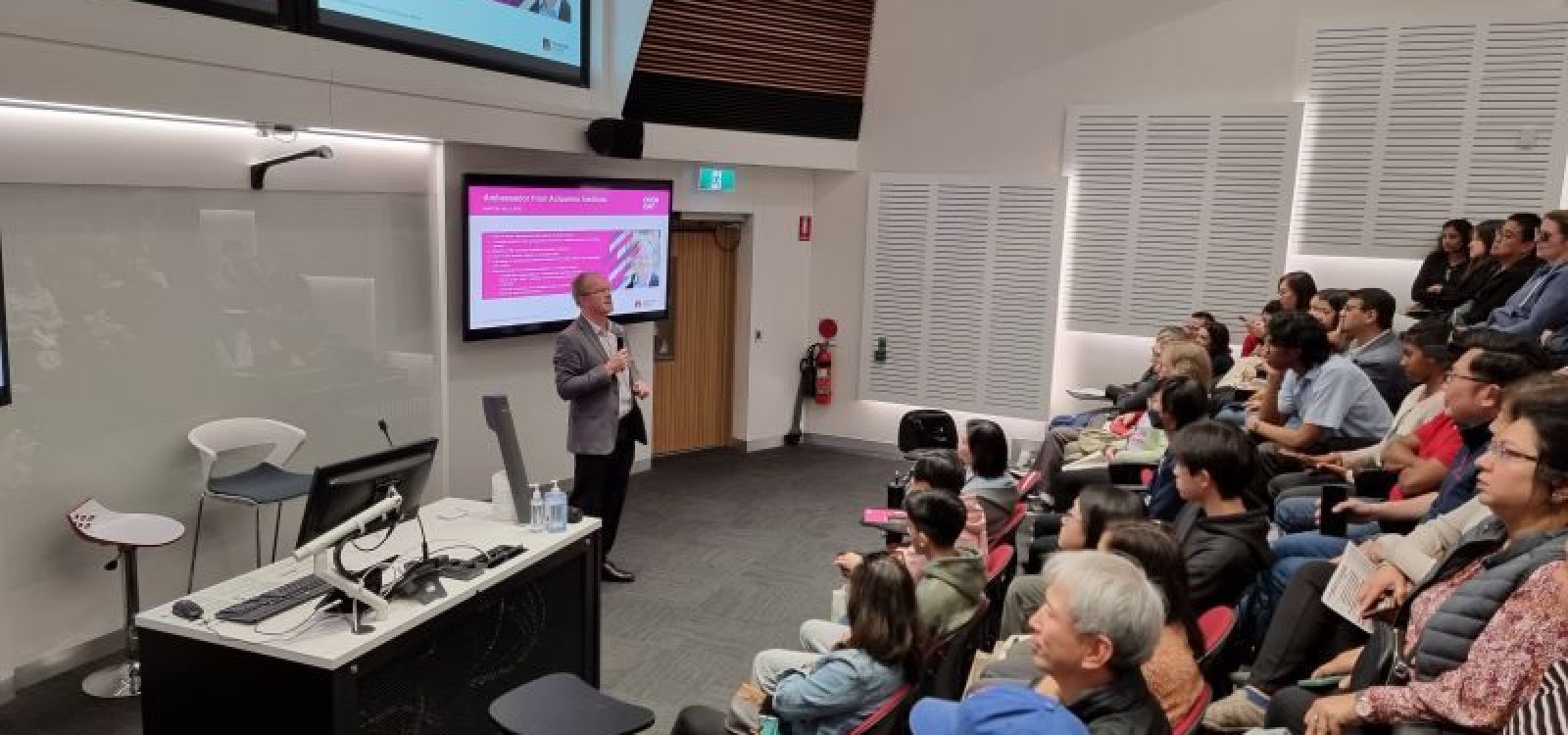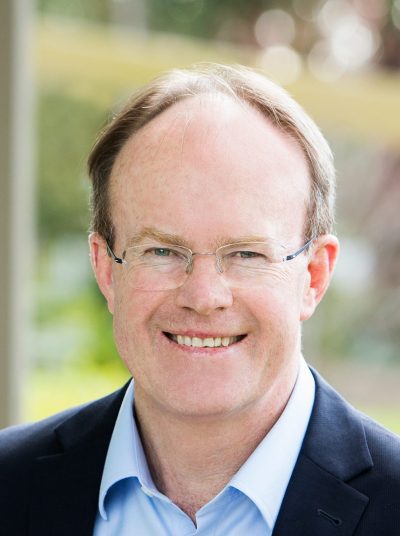
Guiding Tomorrow: Meet a University Ambassador
With a career spanning over four decades, Martin Mulcare has discovered that it’s not just about the skills acquired or positions held that lead to success in the actuarial world. It’s about building a legacy, one block at a time.
Here’s what Martin had to say…

It has been a treat to join the Institute’s Ambassador program. I have enjoyed my visits to Macquarie Uni’s open day and a high school careers expo where I have had the opportunity to meet students (and their parents). They provided a forum to think back over 40 years and distil guidance while answering their practical questions. It has prompted this reflection on my own career.
It’s important that readers do not conclude that I have been either planned or disciplined in my choices. What I would hope that you conclude from this summary is that I have harboured a long-term desire for progression and an acceptance of both change and risk. I have been open to opportunities, but I have only taken them on when I can see the link to what I am familiar with – as well as the challenging areas where I am not familiar but willing to learn.
I now think of my business career as a series of building blocks…
The first block began forming when I decided to enrol in the Actuarial Studies program at Macquarie University. The prompt was my enjoyment of HSC maths and the discovery of a commercial application that looked appealing. I must confess that the prospect of a scholarship with MLC, including vacation employment, added to that appeal. My first block – basic actuarial skills – was completed with three years of study and supplemented with some on the job training. I enjoyed this block for the learning experience, the people that I studied with, the relaxed style of university life and the novelty of the office environment.
I then built my second block – life insurance actuarial knowledge – over the next eight years (excluding a backpack world tour for ten months). This experience was gained by working in three very different life insurance companies and applying knowledge from the first block. I enjoyed this block for the strong sense of career progression as my responsibilities developed. I also appreciate the variety of businesses that I worked in, and the people that I worked with.
The second block enabled me to embark upon forming a third block – consulting skills – which were honed over the next five or so years. The diversity of clients and projects, together with the professional environment, was challenging and rewarding. Most actuaries would guess the important business skills that I developed in this block, including some basic marketing and sales techniques. I enjoyed this block because of the satisfaction of building a new business, as well as the variety of projects – and the people that I worked with inside and outside the organisation.
The combination of those three blocks provided a sufficient platform to launch my fourth block – life insurance leadership. I had always nurtured an interest in general management, and I grasped this opportunity. The initial responsibilities included that of Appointed Actuary and management of around 45 people in their “professional services division”. Over a total of ten years, I graduated from Chief Actuary to General Manager of Life Insurance to Chief Financial Officer to Head of Life Insurance at a larger Australian financial services group. The critical skills that were developed in this decade included strategic thinking, marketing, people management and communication.
I enjoyed this block because of the material business challenges that I had to deal with, as both offered intellectual and behavioural aspects. I also enjoyed the additional benefits to these executive roles as I was invited to a range of cultural, sporting, learning and entertainment events.
That decade also included some executive director experience which was helpful for shaping the fifth block- facilitation and advice. At the relatively young age of 44, I decided to move away from my executive role as I didn’t have the dedication be a CEO – honestly, I questioned if I had the talent too. Instead, I gradually assembled a portfolio of activities which included non-executive director (NED) roles, facilitation of various workshops and advice for small business people.
My NED roles with a life insurer and a reinsurer were directly related to the actuarial and executive experience that was developed in my fourth block. The facilitation and advice activities were more indirectly related and broadly adapted from various formal and informal courses I had attended over that time. I enjoyed this block for the flexibility and freedom that it provided and the range of new networks that I cultivated.
There is a bit of a blur between my fifth and sixth blocks. My current activities also involve Board roles, facilitation and advice. However, they are more likely to be devoted to social purpose than business activities. It may be instructive to draw some of the linkages between my fifth block and my sixth block:
- I learnt some skills as a non-exec director, and especially as a chair, from the talented people who chaired the life insurance and reinsurance boards that I reported to or was a member of. This provided me with the ability to join and even chair, boards of NFP organisations and non-APRA-regulated businesses.
- Facilitation of the Institute’s Professionalism Course provided valuable insights into ethical thinking that I have since pursued with both Primary Ethics and the Ethics Society.
- Facilitation of elements of The Growth Project’s program, promoting collaboration between business leaders and charity leaders, has built a sense of mission that I am now deploying in shared value activities and an ambitious systems change project in the youth space.
This block-by-block career path may appear logical, but I didn’t think of it as particularly rational, discrete or deliberate at the time. It certainly wasn’t what I had imagined when I first thought about “an actuarial career”. My recollection is that I was vague about my career ambitions but I was well aware that there were many pathways to choose from.
This was particularly evident, when I tested several different roles when I returned from my backpack year. I was pleasantly surprised what was actually available at the time!
Curiosity is crucial
I have also reflected on my understanding of the concept of “leadership” over that period. Initially, I did not differentiate between management skills and leadership skills and I placed an emphasis on the former which came more easily to me. I now respect both sets of skills but I admire those people who demonstrate more complex abilities as a leader. If I was to highlight just one attribute of leadership to focus on it would be curiosity. That may seem an unusual choice but I would argue that curiosity is critical for learning and all leaders must be effective learners. More importantly, perhaps, curiosity is the antidote for unfortunate human traits like being judgmental, defensive, narrow-minded or dogmatic that can constrain the effectiveness of a leader.
If I was to sum up my advice to actuarial students at university, I would encourage them to embrace the profession as it is small enough to feel connected to but large enough to offer wonderful, diverse opportunities.
I would also suggest that they explore the healthy tension between “comfort of now” and “challenge of new” so that they can find some harmony as an individual, to make their future career decisions. I would also remind them about the importance of balance, which means different things to different people, to remember that there are many aspects of a good life beyond a good job. And always be curious….
CPD: Actuaries Institute Members can claim two CPD points for every hour of reading articles on Actuaries Digital.






